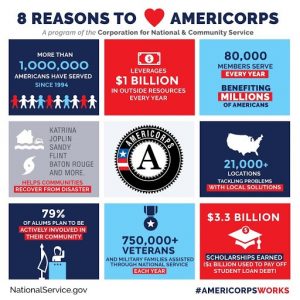By Stas Margaronis
At a time of high unemployment, proposed legislation in Congress, the UNITE bill, would fund 1.5 million new national service jobs over three years through entities such as AmeriCorps and create new jobs tracing Covid cases and dispatching teachers to U.S. schools.
At a time of recession and shut-downs at colleges, UNITE can create new work and experience for college students and graduates in national services positions.
These job opportunities can prepare students to seek work in public health and public school positions as well as for work for local, state and federal agencies. The bill will also aid new jobs at the Federal Emergency Management Agency (FEMA) and the Peace Corps.
The UNITE bill could spur a renaissance in human resources in America. This can attract more young people to National Service, encourage deployments of younger people into public employment at all levels of government and bring with them new energy, idealism and diversity.
Congressman John Garamendi (D-California), a former Peace Corps worker, proposed the UNITE Act of 2020. Cosponsors of the UNITE Act include Jared Huffman (D-California) and Mike Levin (D-California) and others. A similar bill is proposed in the U.S. Senate by Senator Chris Coons (D-Delaware).
The UNITE bill title stands for: “Undertaking National Initiatives to Tackle Epidemic Act of 2020.”
A road map for a nation-wide system of attracting younger Americans into public service including the Armed Forces and AmeriCorps was contained in a March report: INSPIRED TO SERVE: The Final Report of the National Commission on Military, National, and Public Service.
The authors called for a national mobilization of younger Americans:
“We believe that the current moment requires a collective effort to build upon America’s spirit of service to cultivate a widespread culture of service—a culture in which individuals of all backgrounds both expect and aspire to serve their Nation or community and have meaningful opportunities to serve throughout their lifetime. Taken together, our recommendations offer a revolutionary and inclusive approach… “1
A Zoom conference is proposed this Fall, featuring California Congressional representatives, college and high school counselors as well as students to discuss the bill and urge public support in the following ways:
• Support from California colleges and universities as well as from students who might also be interested in working at AmeriCorps or the Peace Corps.
• Encourage other California congressional representatives to co-sponsor the bill.
• Create more public visibility for AmeriCorps and support for National Service.
The UNITE Bill proposes the following:
• The Corporation for National and Community Service (CNCS), which oversees AmeriCorps, is uniquely positioned to mobilize the proposed 1.5 million additional AmeriCorps volunteers.
• The proposed AmeriCorps mobilization is similar to the Works Progress Administration mobilization by the Roosevelt Administration that fought poverty and unemployment during the 1930s Depression.
• The Federal Emergency Management Agency (FEMA) is tasked with leading aspects of the U.S. Federal Coronavirus response but is reportedly understaffed for this task.
• The Peace Corps involuntarily curtailed the service of 7,300 volunteers due to the pandemic.
• Proposed: CNCS to work with local, state, federal, public and private non-profit organizations to assist those most impacted by the Coronavirus emergency. These assignments include supporting public healthcare professionals, veterans, homeless populations and children in low income areas.
• Authorizes the funds necessary to recruit up to 500,000 AmeriCorps volunteers for each of the fiscal years between 2020-2022.
• Requires CNCS to give priority to unemployed veterans, others unemployed due to the pandemic, AmeriCorps and Peace Corps volunteers whose service was involuntary curtailed due to the pandemic. Additionally, compensation for volunteers is set at 200% of the current poverty level roughly double what it is today.

